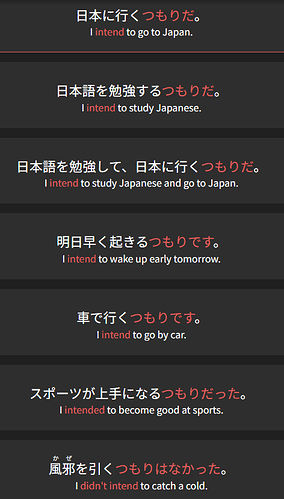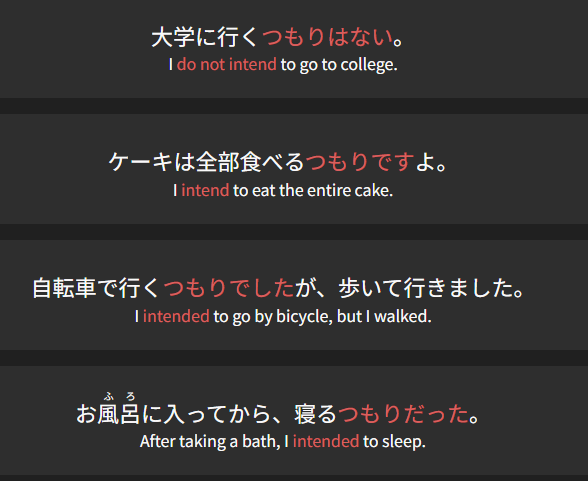You’re going to have to learn tens of thousands of words if you want to get good at Japanese and saying that a vocab SRS needs a mnemonic system built in for all words to be worth using is perhaps misguided if you look at things beyond the short-term. That’s my opinion at least.
That actually depends on your learning strategy. I found straight-up SRS to be just rote learning. I do best with a mix of seeing it used in context (by association) and where it’s hard to retain, I can use a mnemonic. (Talking about vocab.)
The reason why I say the vocab feature is “somewhat useful” (for example, I didn’t say “steer clear”) is because of the sum of its limitations, more of a felt sense than a single knock-out reason, though I picked a particular one to demonstrate my point.
Other points that I found that I find make the vocab feature harder to use, especially for purposes like the OP’s:
I started learning common words and some really common ones have a really ridiculous amount of ways to be translated. This is of course not Bunpro’s fault, my point here is presentation. Some of these words could be grammar points themselves (and are), but there’s no cross-referencing, so the deck blindly repeats them. Hopefully in the future that cross-referencing will happen, but I’m talking about the vocab feature as-is.
Then there are plenty of deviations of the list of meanings given and how it’s translated in the example sentences. It becomes pretty obvious after you fail a SRS query several times and it turns out that the translation they chose is not in the translations they listed. In cases where this just comes with the territory (words that mean “to be” and “to do” are a prime example), a little explanatory text would be fine.
It could be argued that that’s the breadth of meaning a word can take, but for that there are dictionaries. It’s less useful to see word translated in ten different ways, one for each example, than to retain two or three core meanings. Yes, your starting point will be a bit stilted, but since you’re learning, it’s better to retain something and then learn nuance later I find. So if the vocab meanings list was kept to a core (either highlighted and the others listed separately) and the example sentences stuck to them, that would be best for initial retention.
Then, regarding beginner-friendly sentences, I found that even for N5 vocab the sentences certainly seemed more complex. I can’t keep track or cross-reference if they stuck to the vocab list of N5 itself, but it does have a feel of “we have to have at least half a dozen examples for this vocab word” and could have been curated better.
That’s the part where I’d say they need to improve, and I have my doubts about it given the scope of work needed, but I’d be happy to be proven wrong. Because it would make the vocab feature definitely much better.
But to give a full picture, the fact that somebody collected the words, ordered them along several criteria, curated them into batches, allows you to learn them in any order, that’s good. Particularly good is that you can listen to decent quality audio for each which is very important, plus they all can be queried with fill-in queries, which I find important for learning. That’s why I say “somewhat useful” and “depending.”
Now, the question if there’s a better way - hmm, I don’t know. I haven’t seen one yet, but I haven’t ranged that widely. It’s usable and I hope it will be improved further. It’s linked with a good SRS engine with a lot of flexibility, one of the reasons why I chose Bunpro in the first place.
Now, if you compare it with something like Duolingo it of course wins hands down. I deinstalled that very soon because its approach to teaching Japanese is a pedagogic trainwreck. It might work for languages that share familiarity with the ones you know, but I found it was very random.
I like approaches that honor many learning strategies. Admittedly, just like anybody else, I can do without features that don’t work for me but do for others. WK always tries to create these multi-sense experiences, especially visualizing something, which is not how I retain words, so I ignore it. But there might be people who that appeals to, so I still think it’s good they added it.



 .
.

 . Our goal for the way that users will approach vocab, and the strongest feature that we feel we provide, is level appropriate example sentences that help you learn a word through a context net of other related words that you would actually see with the target vocab in real life. This gives the user the nuance of the word and a base for memorization by providing situations that they would actually be used, something that is useful to anybody, regardless of their preferred study method.
. Our goal for the way that users will approach vocab, and the strongest feature that we feel we provide, is level appropriate example sentences that help you learn a word through a context net of other related words that you would actually see with the target vocab in real life. This gives the user the nuance of the word and a base for memorization by providing situations that they would actually be used, something that is useful to anybody, regardless of their preferred study method.